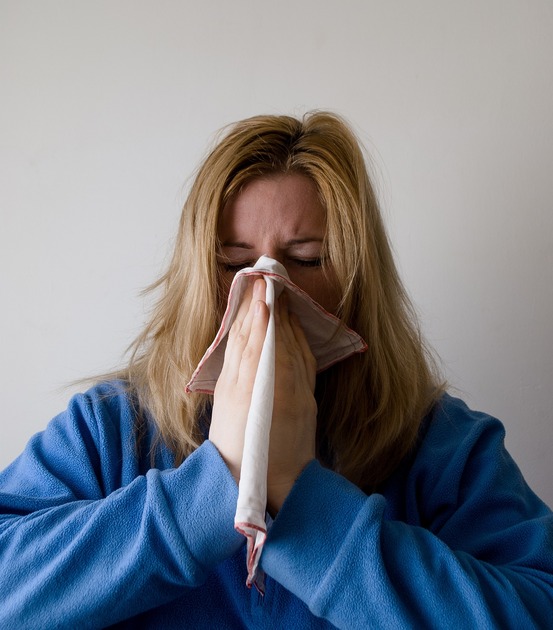Take On Allergy Season With The Vervain Collective's Holistic Approaches
By Dr Nicole Pierce, NMD

People who suffer from seasonal allergies may dread the reawakening of spring, however, people suffer with allergic symptoms year round, and arming yourself early with the proper nutrition and tools in your arsenal will make “allergy season” a breeze. If your symptoms start as soon as the beautiful spring weather starts, taking steps to reduce your susceptibility months ahead of time can help to modulate the immune response, thus stopping allergies before they start.
True allergies (IgE-mediated response) and other hypersensitivity reactions are due to an overly aggressive immune response triggered by ingesting certain foods, touching certain substances, or inhaling irritants such as pollen or animal dander. Allergies or sensitivities to pollen, spores, mold, and dust (also called hay fever or allergic rhinitis) affect the respiratory system and are usually the most difficult to control.
From a naturopathic viewpoint, hypersensitivity reactions are an indication that your “cup has runneth over” and are often associated with stress on adrenal, immune, and digestive functions. Natural treatments are used to support and improve those functions and to alleviate reactive symptoms such as hay fever, skin rashes, fatigue, headaches, and more.
Attending to your overall good health can reduce your body’s burden and help ease allergy symptoms, and good health starts with nutrition. Food is medicine, and what you put in your body matters. People sensitive to airborne allergens may also be sensitive to certain foods and common household products. An Elimination Diet, food sensitivity panel, and/or NAET (an allergy identification and desensitization technique) can help identify foods and other substances that are causing symptoms while greatly improving overall health.
The following are general recommendations for symptom relief during “allergy season” and beyond. The idea is to reduce inflammation and “lighten your load” to reduce the burden on your system so you’re less likely to overreact to benign external stimuli.
PLEASE NOTE: This advice is not meant to replace a comprehensive plan of care for life-threatening, anaphylaxis-inducing allergic reactions.
Healing Nutrition
- Drink 1/2 of body weight in ounces of water and herbal tea daily (e.g., a 160 lb person would drink 80 oz of water/herbal tea). Nettles are
- Eliminate food sensitivities: Elimination/Reintroduction diet, NAET
- Optimize digestion: bone broths, fermented veggies, kombucha
- Flavonoids: apples, berries, red grapes, red onions, capers and black tea
- Dark, leafy vegetables
- Anti-inflammatory and decongestant foods: onions, garlic, ginger, cayenne, horseradish
- Locally-produced RAW honey and bee pollen.
- Probiotic-rich foods (yogurt, kefir, unpasteurized sauerkraut, kimchi, miso and tempeh) and prebiotic-rich foods (asparagus, Jerusalem artichokes, bananas, oatmeal, honey, onions, dandelion greens and roots, chicory roots, maple syrup, dark chocolate and legumes).
- Omega-3 fatty acids (salmon, mackerel, trout and sardines. Plant sources include flaxseeds, chia seeds, hemp seeds, walnuts and algae).
Avoid
- Alcohol, caffeine, and dairy products
- Chocolate
- Food colorings (tartrazine)
- Peanuts
- Wheat/Gluten
- Hydrogenated oils and trans fats
- Sugar!
Supplements, Vitamins and Minerals
- Bioflavonoids (e.g., quercetin, catechin, and hesperidin): Natural antihistamines and strongly anti-allergenic. Bromelain and vitamin C can enhance the action of bioflavonoids.
- Probiotics (e.g., lactobacillus acidophilus and bifidus): Microscopic bacteria that normally inhabit the intestines. Buy a quality product that has 1-4 billion organisms per capsule.
- Multivitamin: High potency and high quality.
- High potency Vitamin A, C, D, E and Zinc.
- Omega-3 fatty acids: Good sources are grass-fed meat and eggs, wild caught fish, high-quality fish and krill oil, and algae oil.
Herbal Medicine
- Nettles (Urtica dioica): Our favorite antihistamine and anti-inflammatory herb. Try to buy local or forage for your own!
- Dong quai (Angelica sinensis): Antihistamine and anti-inflammatory
- Eyebright (Euphrasia officinalis): Reduces congestion and secretions. Good for itchy eyes, sneezing, and excess mucus
- Gingko (Gingko biloba): Contains bioflavonoids and is used as an antioxidant and anti-inflammatory
- Milk thistle (Silybum marianum): Helps reduce allergic, inflammatory, and histaminic reactions and supports liver function
- Red clover (Trifolium pratense): Helps build the body’s resistance to allergies
- Yarrow (Achillea millefolium): Reduces congestion and secretions
- Goldenseal (Hydrastis canadensis): Antibacterial and immune-enhancing properties
- Horseradish (Armoracia rusticana): sometimes you just gotta clear the gunk! (You can also use wasabi for this same effect:)
Homeopathy
The standard dosage for acute symptom relief is 3 pellets of 30C every 4 hours until symptoms resolve. If there is no improvement after 3 doses, a different remedy is given. Homeopathy is a very safe and affordable modality so if one remedy doesn’t work, feel free to move on to another or consult with a professional homeopath or Naturopathic Physician for a more individualized prescription. The following remedies have been shown to be effective in acute, symptomatic relief of hay fever or allergies:
- Allium cepa: Indicated for bland, non-irritating discharge from eyes; copious, watery, acrid discharge from nose; hoarseness; and feeling better in cool air and open room.
- Euphrasia: Indicated for symptoms such as copious, watery, acrid discharge from eyes; non-irritating discharge from nose; dry, hard cough; much sneezing; diarrhea; and feeling worse in open air.
- Natrum muriaticum: Indicated for watery or egg white-like discharges; cold sores; no sense of taste or smell; headaches; and feeling better outside.
- Nux vomica: Indicated for runny nose in daytime, then dry nose at night; violent sneezing; nose feels blocked, but there is watery nasal discharge through one nostril; and feeling worse outside.
- Wyethia: Indicated for extreme itching in the nose and throat; throat feels swollen; back of throat is dry and burning; and sensation as if something were in nasal passages.
Hydrotherapy (see our Naturopathic Guidelines page for some how-tos)
- Castor Oil Packs
- Constitutional Hydrotherapy
- Warming Socks
- Neti Pot
- Steam inhalation (simmer herbs like thyme or oregano in a pot of water then inhale with a towel over your head for several minutes. Afterwards, strain and drink!)
Other Recommendations
- Adequate rest and relaxation
- NAET (Nambudripad’s Allergy Elimination Technique)
- Vigorous exercise may relieve nasal congestion and stuffiness by increasing circulation.
- Acupuncture (we have recommendations for wonderful local practitioners!)
Improve your overall health and make yearly suffering with allergies a thing of the past! You may not completely rid yourself of allergy symptoms, but they can become much more limited and bearable, allowing you to get outside and enjoy all four seasons that beautiful Idaho has to offer!
*You can find many of these recommendations at The Vervain Collective apothecary and on our online store
If you’re interested in exploring these methods further with more individualized treatment, make an appointment with our in-house Naturopathic Physician Dr. Nicole Pierce, NMD





